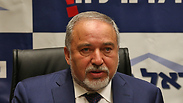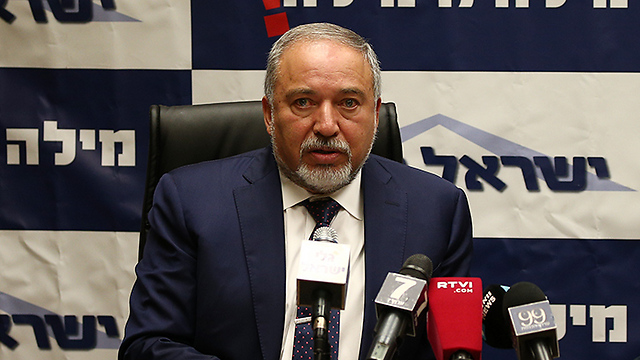
Lieberman: Hezbollah fired rockets on Golan without Assad's knowledge
While the defense minister insists Nasrallah instructed 'to compartmentalize Assad and his regime from the execution of this shooting,' IDF clarifies: 'We still don't know who fired on the Golan,' but allows fire was 'likely done without Assad's knowledge.'
Defense Minister Avigdor Lieberman insisted on Monday that the five rockets fired at it by Syrian artillery cannons early Saturday were not the result of errant fire, but rather a direct order from Hezbollah leader Hassan Nasrallah, the IDF clarified: "We still don't know who fired on the Golan Heights."
“The fire was carried out by a local cell operated by Hezbollah,” Lieberman said during an Yisrael Beytenu faction meeting. “Hezbollah did this in isolation of the Assad regime. There was a personal instruction by Nasrallah to compartmentalize Assad and his regime from the execution of this shooting ... with the goal of dragging us into the Syrian mire."
"Therefore I call here both on the Assad regime ... and also on the Russian forces that are present there, to restrain Hezbollah. And this is another example of why they should be kicked out of Syria as fast as possible," the defense minister added.
However, a defense official noted that "Lieberman's comments on Nasrallah and the rocket fire on the Golan did not come from the army, but are instead based on his understanding, judgment and perspective."
Meanwhile, the IDF did confirm the rocket fire came from Assad-controlled territory, and likely without his personal knowledge.
"Rocket fire in the middle of the night and in an unusual amount (five rockets) leads us to believe it is likely not errant fire," a military official said.
Lieberman's office did not immediately respond to the comments contradicting him. A Lieberman confidant who requested anonymity told Reuters: "The defense minister spoke based on his own judgment and assessment."
The government of Prime Minister Benjamin Netanyahu has been warning that Israel, which has largely stayed out of the six-year-old Syrian civil war, could step up attacks in retaliation for shelling across the frontier, or to block Damascus's Iranian and Lebanese Hezbollah reinforcements from setting up bases.
That could thrust the Israelis into confrontation with Syria and potential run-ins with its big-power backer, Russia. Israel last battled Hezbollah in Lebanon in 2006, and has occasionally fired on Syria to attack Hezbollah or Iranian targets during the civil war, but has mainly avoided direct fighting against Syria since their last war in 1973.
Twice last week, mortar rounds or rockets launched from Syria hit areas of the Israeli Golan Heights, causing no casualties but drawing Israeli artillery fire against Syrian army posts.
Syria's Foreign Ministry said on Saturday, after projectiles fired from Syria drew an Israeli attack on three Syrian artillery guns, that Israeli strikes would have "grave consequences".
Reuters contributed to this story.











